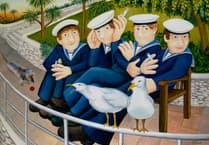AN UNUSUAL sight of two female ducks sharing a nest is the hottest show in town at a West Devon theatre.
The two ducks are attracting a protective audience of theatre-goers as they happily co-exist in the canal-side area of Tavistock Wharf on top of a pot of ivy. They appear to feel safe in the space bounded by the theatre and the canal.
Under the pair are more than 30 eggs and only a few feet away are the male drakes who seem to be their mating partners on guard patrol.
Theatre staff are proud of their guests who have been happily incubating their eggs for the past two weeks and are excitedly awaiting an extensive brood of ducklings soon.
Like an excited mother-to-be Natalie O’Byrne, theatre coffee shop manager, said: ‘It’s making us all a bit nervous waiting for the eggs to hatch. They do nest around here occasionally and seem to be perfectly happy to do so, as they are safe and next to the canal where they normally live. But this is the first time we’ve seen two female ducks sharing a nest and to have eggs at the same time.
‘We just hope as many as possible are born and we have lots of ducklings. I don’t know how they will manage if they all come out.’
The debate in the cafe then turned to how the mummy ducks would recognise their own off-spring and to the identity of the fathers.
The two expectant females are often seen flying into Tavistock Canal when disturbed and joined by two mallards on the water, who appear to be the fathers.
The RSPB says Mallards will nest in urban areas if they are close to water and food, even if the sites are not perfect. In the Tavistock case, there is abundant food, attracting more mallards than are able to nest nearby, hence the choice of the theatre courtyard.
About 28 days after beginning incubation the eggs hatch together. This takes about 24 hours. The ducklings stay in the nest for at least ten hours, getting used to using their legs. The female then leads them to water.
The sooner the ducklings get to water to feed, the better their chances of survival. If the nest is some way from water, this first journey can be the most perilous time in a duckling’s life.
Ducklings can feed themselves as soon as they reach water. They depend on their mother for warmth for a few days. They get the waterproofing for their down from their mother. She also protects her ducklings from attacks by other mallards. Ducks do not tolerate stray ducklings close to their own brood, and females kill small strange young they encounter. Ducklings take 50-60 days to fly and become independent. They are able to breed when they are a year old.





Comments
This article has no comments yet. Be the first to leave a comment.